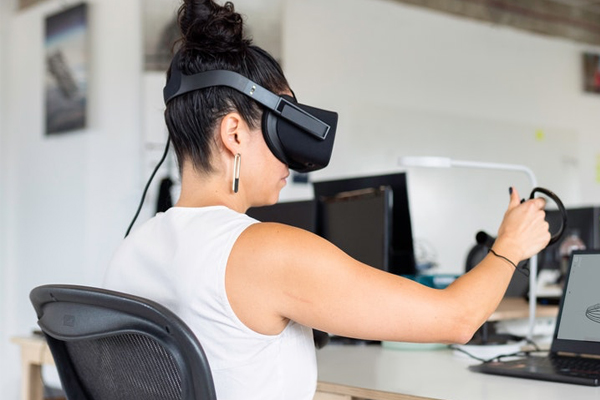Demand for workplace virtual reality (VR) soft skill training is poised for ‘explosive’ growth by 2022, according to a new study.
The report carried out by Mursion (specialising in virtual reality training for workplace emotional intelligence) and Future Workplace (an advisory and membership organisation that prepares HR leaders for the future of work), reveals that demand for VR ‘soft skill’ training will double by 2022.
The report, entitled VR Changes the Game for Soft Skills Training, demonstrates how VR training simulations have proven to be successful in business-critical areas such as team management and collaboration; diversity, equity, and inclusion; and sales and customer service. It also examines the rapidly growing trend of VR simulation training being adopted as a means to close the soft skills gap amid a wave of high-pressure situations and changes that managers and business leaders are experiencing in the workplace right now.
KEY STATISTICS
According to the report, more than 72% of learning and development leaders across industries will have tried VR for soft skills training at their organisation by 2022. That is more than double the 35% of respondents who are currently deploying VR skills simulations to help employees navigate challenging workplace scenarios in customer service, peer conflict resolution, and sales, as well as timely and critical training for diversity and inclusion, and harassment.
VR for soft skills training delivers on what learning leaders say is the future of learning: “engaging” (55%), “personalised” (49%) and “measurable” (41%), confirmed the report. In fact, companies such as H&R Block and T-Mobile have already reported success with VR learning.
PROFITABLE CASES
According to H&R Block’s customer call centre data, two 30-minute sales VR sessions saved 4,119 hours (171 days) of average handling time – that’s a 10% overall reduction – leading to a performance improvement equal to 3+ months of on-the-job learning.
T-Mobile recently had to handle high-stakes corporate change management communications prior to its merger with Sprint. After VR simulations with a “change-resistant” employee, 90% of managers showed strong competency in their real conversations. T-Mobile then expanded its scope to include customised simulations of executive presentation and communication skills.

VR ACCELERATING SKILL MASTERY
“Amid the effects of the Covid-19 pandemic, economic disruptions, employee layoffs and furloughs, the needs for employees have never been greater and the stakes have never been higher for managers to possess the ‘human’ skills needed to drive business performance,” stated Mark Atkinson, CEO of Mursion. “The challenge of working remotely is intersecting with major societal shifts that are transforming workplace communications and company values at their core. Companies are looking for a solution, and VR training accelerates skill mastery in a realistic, efficient and measurable way.”
In fact, Mursion has reported tremendous growth thanks to a surge in demand for training, including “a doubling of revenue and staff in less than a year, a 90% customer retention rate, a 140% increase in customer spend year-over-year, and achieving profitability”.
“The future of VR training for employees to learn critical communication and interpersonal skills is limitless,” commented Jeanne Meister, Managing Partner, Future Workplace. “Businesses and employees are harnessing the value of VR for soft skills. VR is becoming a top modality for training in conflict resolution, communications, and sales of new products and services.”
For more information about the VR Changes the Game for Soft Skills Training report click here.







































